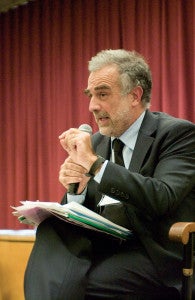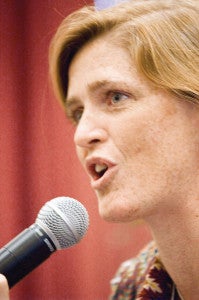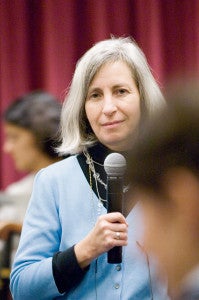HLS students learn the lessons of Nuremberg in Cambridge, Arusha and The Hague

ICC Chief Prosecutor Luis Moreno-Ocampo
It’s been a good couple of years at Harvard Law School for students interested in global justice. The first chief prosecutor of the International Criminal Court, Luis Moreno-Ocampo, left The Hague to teach a course at the school in January 2005 with Professor Philip Heymann ’60. Spring semester that year, Richard Goldstone, who served as the first prosecutor at the international criminal tribunals for the former Yugoslavia and Rwanda, offered two classes. South Korean judge Sang-Hyun Song, who was recently elected to a second term on the ICC, has also taught at the school.
This fall, an HLS conference explored the legacies of Nuremberg, 60 years after the trials challenged the world to apply law to mass violence. Organized by Professor Martha Minow with the educational organization Facing History and Ourselves, it focused on connecting lawyers and educators in efforts to prevent mass atrocities that continue despite international law. ICC chief prosecutor Moreno-Ocampo spoke, as did the court’s senior trial lawyer, Christine Chung ’90, along with Nuremberg trial participants such as prosecutor Benjamin Ferencz ’43–a vocal advocate for the ICC–and scholars such as Stephen Schlesinger ’68, an expert on the history of the U.N. There were also teachers and students, including Rebecca Cohen ’07, whose film on Nuremberg participants was screened; Rebecca Hamilton ’07, who has mobilized students to pressure the U.S. government and Harvard to condemn the Sudanese genocide; and Noah Weisbord LL.M. ’04, an S.J.D. candidate who has studied the Rwandan gacaca courts and worked at the ICC.

The conference was the culmination of a year of events at HLS, including a film series and a library exhibit (see Gallery) spearheaded by 2Ls Hallie Fader and Alina Zagaytova.

When it comes to helping the international tribunals achieve their potential, the human rights community plays an important role, says Binaifer Nowrojee LL.M. ’93, clinical instructor at the HLS Human Rights Program, which involves students in that process. Nowrojee has served as an expert witness at the ICTR and supervised many of the students who have interned at the tribunal over the past three years. Projects they’ve worked on include helping Nowrojee prepare her testimony, and contributing to memos analyzing and sometimes critiquing the court’s judgments on sexual violence in the context of the latest jurisprudence in the area. This January, Meredith Osborn ’06, who interned at the tribunal in 2004, was asked back to work on a closing brief for one of the prosecution teams.
In addition to students who have interned at the tribunals and the ICC, others have helped from Cambridge.This year, Amy Penn ’06 has been providing the ICTY’s senior prosecutor, Kenneth Scott ’79, with legal support, working with HRP Clinical Director James Cavallaro in efforts to streamline prosecution while respecting due process norms.